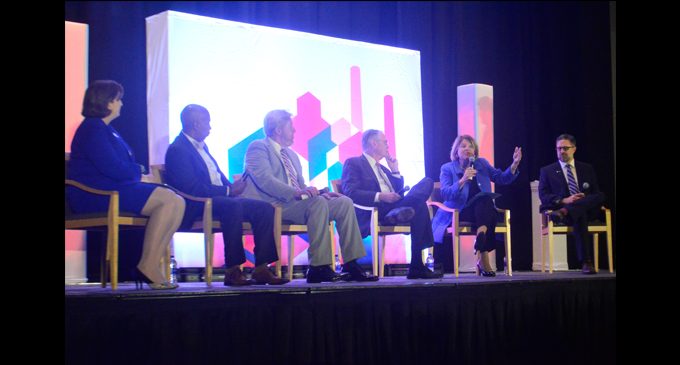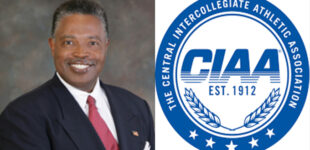Winston-Salem Chamber hosts inaugural State of Education luncheon
Last week the Winston-Salem Chamber invited all six presidents and chancellors from the colleges and universities in the city to participate in a panel discussion on their relationship with the business community.

In an attempt to bring the community together for an important conversation on workforce opportunities and the role institutions of higher education play in building those opportunities, last week the Winston-Salem Chamber invited all six CEO’s from the colleges and universities in the city to participate in a panel discussion.
The panel included: Janet Spriggs, President of Forsyth Tech Community College; Elwood Robinson, Chancellor of Winston-Salem State University; Charles Petitt, President of Piedmont International University; Nathan Hatch, President of Wake Forest University; Sandra Doran, interim president of Salem College; and Brian Cole, interim president of UNC School of the Arts. The chamber’s inaugural State of Education luncheon was held at the Benton Convention Center on Sept. 4.
While addressing the room during the luncheon, Mark Owens, president of the Winston-Salem Chamber, talked about the importance of businesses having working relationships with the colleges and universities in the city. He said, “With the changing economy, communities must focus on recruiting and retaining talent in order to provide the greatest asset of all to your company – good people.
“In this new era, we have to ask a lot from our colleges and universities, because in order to be successful, we need our universities’ help to develop talent. We also need their help to recruit and retain talent in our community.” Owens continued, “The collective impact of building our knowledge around retaining graduates equals billions of dollars in economic impact for Winston-Salem and Forsyth County.”
Following lunch and individual introductions, Owens kicked off the discussion by asking the panelists about some of the gaps in workforce programs in higher education and some courses that may need to be added to the curriculum.
President Hatch called all universities to offer courses that teach technical skills. He also suggested taking a closer look at the job market and create courses based on need and the need for more internships for students.
“I think technical fields are growing so much and I think at every level, whether it’s community college or whether it’s undergraduate or graduate, they should be technically competent, producing more engineers so companies can hire more people, or even sophisticated technicians. I think seeing what the market is and making sure we’re providing an open invitation for what’s needed,” Hatch said.
President Petitt said there’s a need for more collaboration between businesses and colleges because industries are rapidly changing. He said, “Having close collaboration between industry and the colleges is required because they’re changing more quickly than we can even notice.”
Chancellor Robinson raised concerns about the growing gap between the “haves and have-nots” and keeping costs affordable so every student has the opportunity to further their education after high school.
“I worry about this growing gap between the haves and the have-nots and as we move into the new economy, it’s going to require that folks have college degrees and access to education,” Robinson said. “So I want to make sure we maintain a level of affordability so folks can come in, get a quality education, and go out and get a job and change the trajectory of your family.”
When asked about some of the needs in the local job market, President Spriggs said there are some gaps in the area of information technology and cybersecurity. She said, “I think there’s some holes, possibly in IT.” Spriggs continued, “There’s a misunderstanding, possibly in the skill set that our graduates have around that, but I think by and large our students do understand there’s opportunities if we help them see the breadth of what that opportunity can look like.”
UNCSA interim president Brian Cole said the biggest opportunity gap for students pursing careers in the arts is in entrepreneurship training. Cole said that is the issue at UNCSA and every other arts institution in the country because the students aren’t staying to work for somebody else, but to create their own enterprise.
“They’re staying here to create their own business or to see themselves as an independent artist where they are the business or the product,” Cole said.
To wrap up the discussion, Owens asked the panelists what is one thing the business community can do to support their efforts at their institutions. Although each panelist had an opportunity to respond to the question, Sandra Doran’s response was the one that summed up everything everyone else said. Doran, who is the interim president at Salem College and Academy, said students are most interested in careers that have an impact on their communities. She said the students are ambitious and want to change the world.
“When I think about how the business community can help support our students, friends, they’re ambitious. These students want to change the world,” she said. “And our job as educators is to give them the academic skills, the curricular skills, and that learning experience that they are confident that they can change the world, but that requires support from the community, whether it’s the non-profit community or the business community.”














